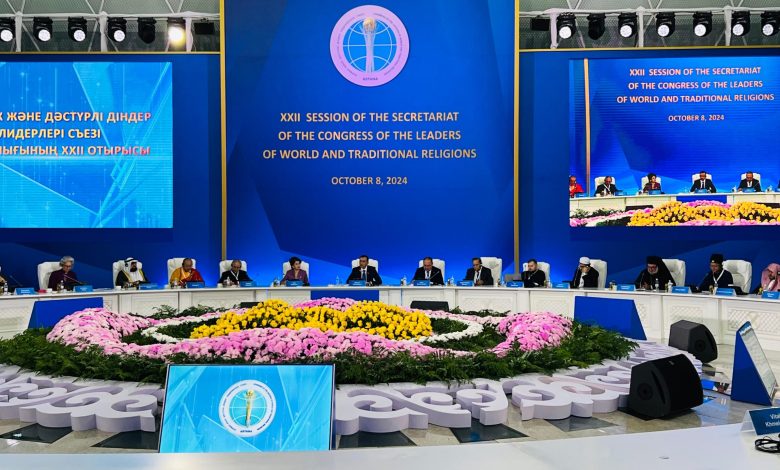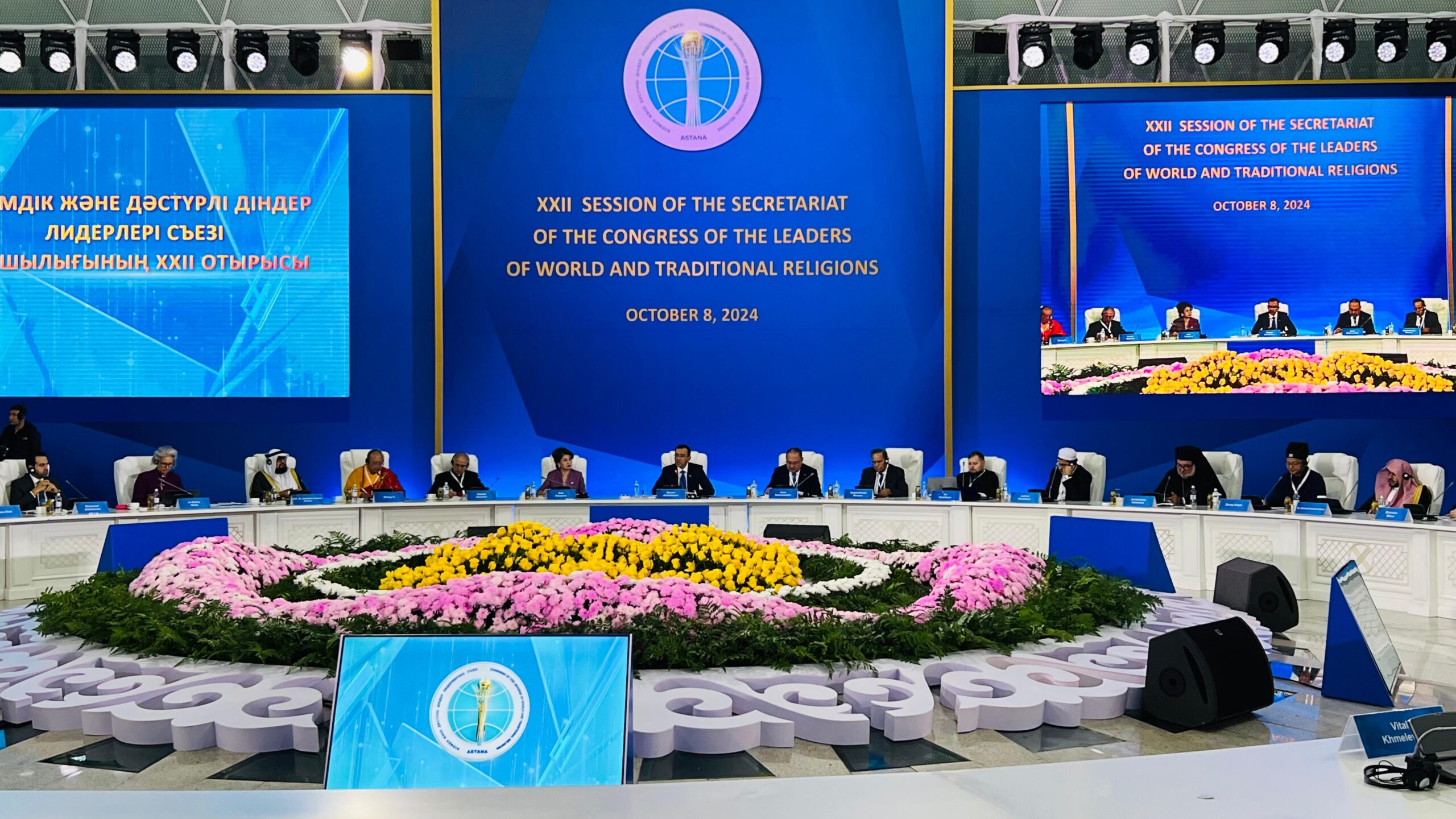Global Religious Leaders Convene in Astana to Discuss Conflict Resolution

ASTANA – World’s religious leaders came together for the 22nd meeting of the Secretariat of the Congress of Leaders of World and Traditional Religions in Astana on Oct. 8 to discuss ways to tackle conflict, bridge differences, and to advance the congress’s mission.

The secretariat meeting gathered around 30 religious leaders and heads of international organizations from 20 countries. Photo credit: Aida Dosbergenova/The Astana Times
The theme of peaceful conflict resolution was a focal point for many participants, especially in regard to the escalating conflict in the Middle East and the ongoing war in Ukraine.
Maulen Ashimbayev, chairman of the Senate, the upper house of the Kazakh Parliament, and head of the secretariat, opened the 22nd session by emphasizing the role of diplomacy and peaceful conflict resolution in today’s world.
“Over the past few years, humanity has faced unprecedented challenges. Today, the world is in a situation where all current global challenges and threats are intertwined, interdependent and mutually reinforcing. The situation in the Middle East is very difficult. We are all deeply concerned about the escalating tensions in the region. Our country calls on all parties involved to abandon the use of force in order to avoid civilian casualties and further deterioration of the situation. In this regard, we note the importance of taking early measures to resolve disagreements in the Middle East exclusively through political and diplomatic means, within the framework of the principles of the UN Charter and international law,” said Ashimbayev.
“In addition, the bloody conflict in Ukraine continues. In general, there are more and more hot spots on the planet. The escalation of conflicts undermines the achievements of the international community over the past decades, leads to an arms race and most importantly, suffering and losses among the civilian population,” he added.
Ashimbayev emphasized that in an era marked by the rise of radical ideologies, xenophobia, and the spread of malicious misinformation, the role of an interfaith dialogue platform is evermore important.
World religious leaders call on building bridges
Abdelrahman Moussa, head of the office of Sheikh Al-Azhar, echoed Ashimbayev’s words regarding peaceful conflict resolution.
“Despite the challenges that humanity is facing today and despite the growing tensions, Al-Azhar is always against using force in any context, especially regarding the Middle East,” he said.
Moussa also addressed the need to use high moral values as a guiding principle in all political decisions.
“What we see spreading is the hatred towards other religions, and this is the key problem of humanity. From the moment when God has created this world and all of us, the aim was to unite us and to provide security of a humanity,” he said.
“Sheikh calls all the representatives of countries and all the responsible persons of international organizations to provide higher moral values when adopting any kind of decisions. When any decisions are being taken, first and foremost, we need to make sure that no hatred or disrespect towards other religions takes place,” added Moussa.
Khaled Akasheh, bureau chief for Islam of the Dicastery for Interreligious Dialogue of the Holy See, called for fostering the spirit of love for humanity and praised the role of the congress in this endeavor.
“To guarantee necessary divine blessing and the wishful success, we have to be motivated only by the spirit of love and service to humanity – organizers and believers alike. In this congress, I would like to affirm what I said in the past: that the congress is a gift from Kazakhstan to humanity, such should be the attitude moving forward, organizers and participants alike,” said Akasheh.
Jo Bailey Wells, deputy general secretary of the Anglican Communion and bishop for the Episcopal Ministry of the Anglican Communion, also commended Kazakhstan’s efforts in promoting interfaith dialogue.
“The past year underlines that dreams of peace cannot come true while deep political, strategic and religious fault lines remain unbridged. The greater our grief, the greater our thanks to Kazakhstan for their vision and commitment that is enshrined in this palace of reconciliation, empowering us annually as religious leaders for that bridge building,” said Wells.
“Religion does not get a good press. It is too readily associated with conflict rather than with peace. I urge that here together, we commit to change that,” she added.
Zheng Ci, vice president of the Association of Buddhists of China and president of the Buddhist Association of the Hubei Province, highlighted the progress the congress has made since its establishment in 2003.
“Representatives of various confessions, religions and cultures during those 20 years of joint efforts and meetings have gained certain success. We’re creating new ways and mechanisms of the new world. Jointly, we take a lot of measures against extremism and terrorism,” he said.
“The unique quality of the congress secretariat is tolerance and openness while we all keep up our traditional visions and try to keep pace with the modern world. I would like to highlight that despite the various tensions and crises, we are jointly aspiring to our goals, and we’re actively engaging in ensuring peace, harmony and the development of human civilization,” added Ci.
He also noted that the creation of a peaceful and harmonious world structure is not a short-term process, and it requires joint efforts.
Goodwill ambassadors – new advocates of spiritual diplomacy
During the secretariat’s 21st session last year, the Concept of Development of the Congress of Leaders of World and Traditional Religions for 2023-2033 was adopted, outlining a vision for the congress’s development over the next decade. This year, the secretariat appointed goodwill ambassadors, who will become an essential element in promoting spiritual diplomacy.
According to the regulation draft on the status of the goodwill ambassadors, they will “foster the potential of spiritual diplomacy and promote the congress’s objectives and priorities at the international level.”
“We believe that this decision is well-timed and more relevant than ever before, as mutual distrust between certain countries is dangerously deepening. This leads to the appearance of new conflicts, while many old problems persist in various regions of the world,” said Akan Rakhmetullin, first deputy minister of Foreign Affairs of Kazakhstan and deputy head of the secretariat.
The secretariat of congress elected five goodwill ambassadors. Among them are Theophilos III, patriarch of the Holy City of Jerusalem and all Palestine, Mohamed Abdelsalam, judge and secretary-general of the Muslim Council of Elders, Jo Bailey Wells, deputy general secretary of the Anglican Communion and bishop for Episcopal Ministry of the Anglican Communion, Thich Duc Thien, secretary general and deputy chairman of the Executive Council of Viet Nam Buddhist Sangha, Dimash Kudaibergen, Kazakh singer, composer, multi-instrumentalist, and holder of the high honorary title of People’s artists of Kazakhstan.
First forum of young religious leaders
The secretariat also announced the first forum of young religious leaders to be held on Oct. 9.
“During the seventh Congress of Leaders of World and Traditional Religions, its participants unanimously expressed support for young people and for holding forums of young religious leaders within the framework of congress in order to ensure the continuity of generation, in order for the next generation of the leaders to also interact and contribute to solving global problems of mankind,” said Kanat Iskakov, vice-minister of Culture and Information of Kazakhstan and deputy head of the secretariat.
“The main purpose of the forum is to create a platform for dialect and exchange of achievements of young people, as well as discussion of the most pressing problems faced by the younger generation,” he added.

